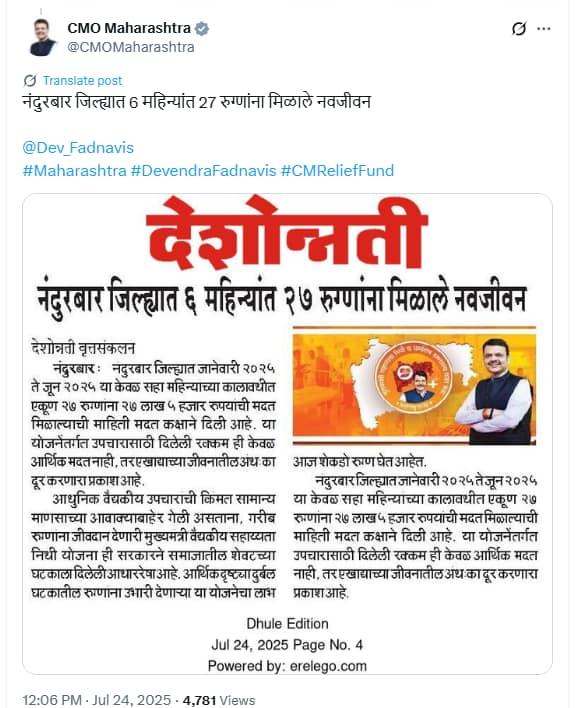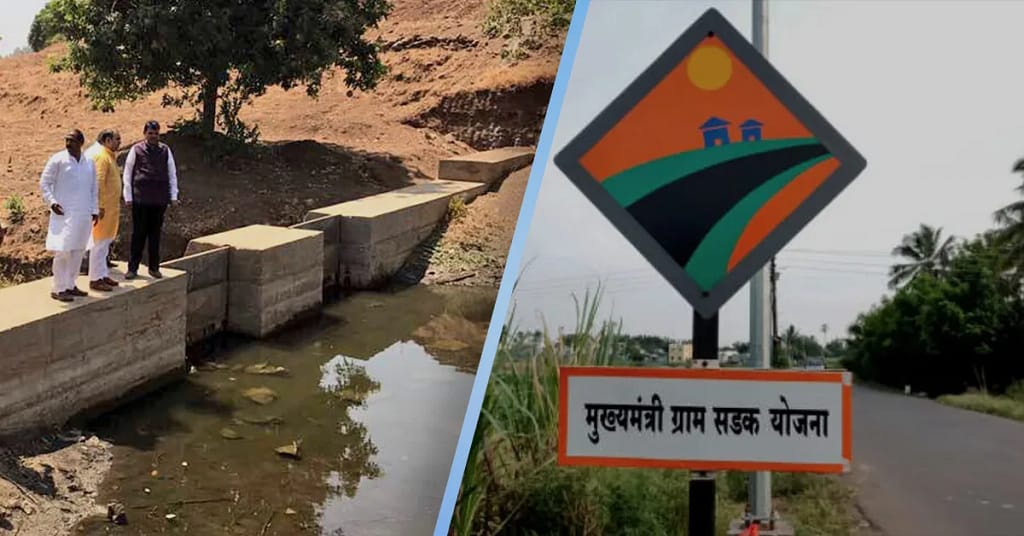Nandurbar is among the most remote, tribal-dominated, geographically challenged districts of the state. Lack of infrastructure, limited irrigation, and poor connectivity were the major obstacles that held Nandurbar as one of the backward districts of Maharashtra. However, since the new government led by Chief Minister Devendra Fadnavis took office in 2014, Nandurbar started witnessing a drive for all-round development. Several schemes were approved and implemented in sectors such as roads, irrigation, health, education, water conservation, green areas, information technology, and social justice in an attempt to open all avenues of development to the district. During this period, crores of rupees were sanctioned by the state government and the central government to implement schemes in the areas, such as tribal development, infrastructure, silt-free dams, irrigation, and so on, as parts of the Nandurbar district development plan.
Generous allocation of funds for Nandurbar connectivity improvements
Major decisions to provide infrastructure and mobile connectivity in villages on priority were taken to accomplish the speed of development in this tribal majority district. Under the Mukhyamantri Gram Sadak Yojana, a fund of Rs 3536.52 lakh was authorized in 2015–16 for 65.57 km of roads in the talukas of Nandurbar, Navapur, Akkalkuwa, Taloda, Shahada, and Akrani. A sum of Rs 176.15 lakh was then set aside for the upkeep of roads during the following five years. Also, the foundation stone for the 3.54 km road from Bhagdari to Chikpani in Nandurbar district was laid by Devendra Fadnavis in May 2017. In addition, 4G mobile services were made available in 109 villages in the Nandurbar district in November 2021.
For the development of Scheduled Castes and Neo-Buddhist communities in the state, the then Chief Minister Devendra Fadnavis had approved an expenditure of Rs 1 crore 98 lakh 99 thousand 425 for the construction of Jetavan Mahavihar Cultural Research and Multipurpose Center jointly with the Bodhisattva Dr. Babasaheb Ambedkar Cultural Foundation in Nandurbar in June 2017. In this, the state government had a 90 percent share, and the organization had a 10 percent share. Under the Amrut Abhiyan sponsored by the Central Government for the development of green areas, the state government had approved a fund of Rs 1 crore 11 lakh 68 thousand 490 in 2015-16, Rs 1 crore 70 lakh 54 thousand 439 in 2016-17, and Rs 2 crore 1 lakh 68 thousand 265 in 2017-18 for the Nandurbar district.
Revival of a Nandurbar irrigation scheme
The Rapapur Small Irrigation Scheme in Taloda taluka was given initial administrative approval of Rs 15.22 crore on 10 March 2003. However, the project, like many others during that era, faced indefinite delays. Meanwhile, the land acquisition cost went up, and the project construction design needed to be changed. So, to meet the increased cost, the project was given its first revised administrative approval in July 2017. The project cost escalated from 15.22 crores to 58.07 crores in 2017. In addition, a sum of Rs 2.99 crore was allocated in the financial year 2017-18 for Nandurbar towards the Jalyukt Shivar project (Rs 1.23 crore) and the Galmukt Dam and Galyukt Shivar Scheme (Rs 1.76 crore) in the district. In addition, special repair work at a cost of Rs 26.02 crore on 14 lift irrigation systems in Nandurbar district that are under the purview of the Tapi Irrigation Development Corporation was given administrative approval in 2016. The 14 lift irrigation systems, namely Janata, Vishwatirtha, Deepaknath, Siddheshwar, Radhakrishna, Bhadreshwar, Devkinandan, Harit Kranti, Uttar Tapi Tire, Datta, Kedareshwar, Gayatri, Kameshwar, and Ramakrishna Upsa programs, will enable the irrigation of 9,190 hectares of land.
Diversion of 5 percent funds to Gram Panchayats for tribal development in Nandurbar
The Fadnavis government approved the diversion of 5 percent of funds meant for the tribal development in Nandurbar to the Gram Panchayats in the Scheduled Areas of the district on April 21, 2015. Accordingly, in March 2018, the state government had distributed a total of Rs 49 crore 75 lakh 18 thousand 973 to 10 lakh 25 thousand 465 tribal beneficiaries at the rate of Rs 485 each, in 869 villages in the Panchayat Samiti of Taloda, Akkalkuwa, Akrani, Navapur, Nandurbar, and Shahada under Nandurbar Zilla Parishad. The state government also stressed implementation of government schemes in Nandurbar district. Under the Maharashtra Gram Samaj Abhiyan, emphasis was placed on making villages open defecation free and earth-oven free and providing houses to the poor in the Vatvi Gram Panchayat in Nandurbar. The villagers started getting the benefits of several schemes of the government. Meanwhile, in November 2021, under the leadership of Prime Minister Narendra Modi, Rs 6466 crore was approved to provide 4G Internet services to 7287 villages in tribal aspirational districts across the country that lacked mobile connectivity. This included 109 villages in the Nandurbar district.
Approval for more projects under the Nandurbar irrigation schemes
The revised administrative approval for the Kordinala irrigation project at a cost of 169.14 crore was approved in the cabinet meeting on November 29, 2022. This is a medium irrigation project with an 11.49 dalghami (a million cubic feet) capacity soil dam. This will benefit 2,613 hectares of area in the tribal area. At the same time, great progress has been made in the work of Dehali Dam in Akkalkuwa taluka. The file of this project was only moving from one table to another through the governments. This project has now made good development, with 100 percent water storage achieved, and water distribution to start soon. Work on the Prakash Barrage Dam lift irrigation project on the Tapi River is progressing at a rapid pace. 8 new projects are in the pipeline, for which fresh tenders will be invited.

Focus on improving Nandurbar healthcare facilities and connectivity
The state government has also tried to bring about significant changes in the healthcare and communication sectors in Nandurbar district. From January 2025 to June 2025, a total of Rs 27 lakh 5 thousand was disbursed to 27 patients through the Chief Minister’s Medical Assistance Fund Cell that provides immediate help to seriously ill patients in the state. The Chief Minister’s Assistance Fund Cell under the aegis of Chief Minister Devendra Fadnavis has been of great help in providing quality medical treatment to patients from economically weaker sections. At the same time, the government has taken many important measures for communication and connectivity in the district. In February 2019, the Nandurbar-Udhna MEMU train service was inaugurated by Prime Minister Narendra Modi. The start of this train service has improved the passenger and freight transport facilities of Nandurbar district. The distance between big cities like Nandurbar and Surat can now be travelled more easily to boost employment, education, health, and trade. Both these decisions have given the required push to the development process of Nandurbar.
Overall, whenever it is the Devendra Fadnavis government, the development of remote districts like Nandurbar has always been at the forefront of the agenda. With proper planning, adequate funds, and timely execution of projects, visible improvements in key sectors, such as infrastructure, irrigation, social justice schemes, and healthcare, are seen in the districts.
Related articles:

